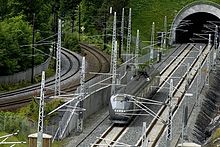Skaugum Tunnel

A GMB Class 71 train leaving the tunnel
|
|
| Overview | |
|---|---|
| Line | Asker Line |
| Location | Asker, Norway |
| Coordinates | 59°51′08″N 10°26′36″E / 59.8521°N 10.4433°ECoordinates: 59°51′08″N 10°26′36″E / 59.8521°N 10.4433°E |
| System | Norwegian railway network |
| Operation | |
| Opened | 27 August 2005 |
| Owner | Norwegian National Rail Administration |
| Operator |
Norwegian State Railways Airport Express Train |
| Character | Express trains |
| Technical | |
| Line length | 3,790 m (12,434 ft) |
| No. of tracks | Double |
| Track gauge | 1,435 mm (4 ft 8 1⁄2 in) |
| Electrified | 15 kV 16 2⁄3 Hz AC |
| Operating speed | 160 km/h (99 mph) |
The Skaugum Tunnel (Norwegian: Skaugumtunnelen) is a 3,790-meter (12,434 ft) long railway tunnel in Asker, Norway, on the Asker Line. The tunnel runs between Asker Station and Solstad and was built as part of the first stage of the Asker Line, between Asker and Sandvika. Construction started in February 2002 and the tunnel opened on 27 August 2005. The tunnel was built by Mika for the Norwegian National Rail Administration using the drilling and blasting method with one crosscut. During construction there was one blasting accident. Since the tunnel opened, there have been problems with leaks damaging the infrastructure. The tunnel has double track, is electrified and allows for a maximum speed of 160 kilometers per hour (99 mph). The cost to build the tunnel, excluding the infrastructure, was 450 million Norwegian krone (NOK). The tunnel has accelerated intercity and regional traffic west of Oslo and freed up capacity for the Oslo Commuter Rail on the old Drammen Line.
The Skaugum Tunnel is a 3,790-meter (12,434 ft) long tunnel with a cross-section varying between 105 and 115 square meters (1,130 and 1,240 sq ft). It carries the double-tracked Asker Line between Asker Station and Solstad. The tunnel runs mostly through Cambrian-Silurian sedimentary slate, nodular limestone and shale, with local occurrences of Permian igneous rock. The line is electrified at 15 kV 16 2⁄3 Hz AC and allows for maximum speeds of 160 kilometers per hour (99 mph). The tunnel has frost isolation 300 meters (980 ft) into the tunnel from each end and frost fans which ensure that the air stays put in the middle of the tunnel to hinder cold air from reaching in past the frost isolation.
...
Wikipedia
